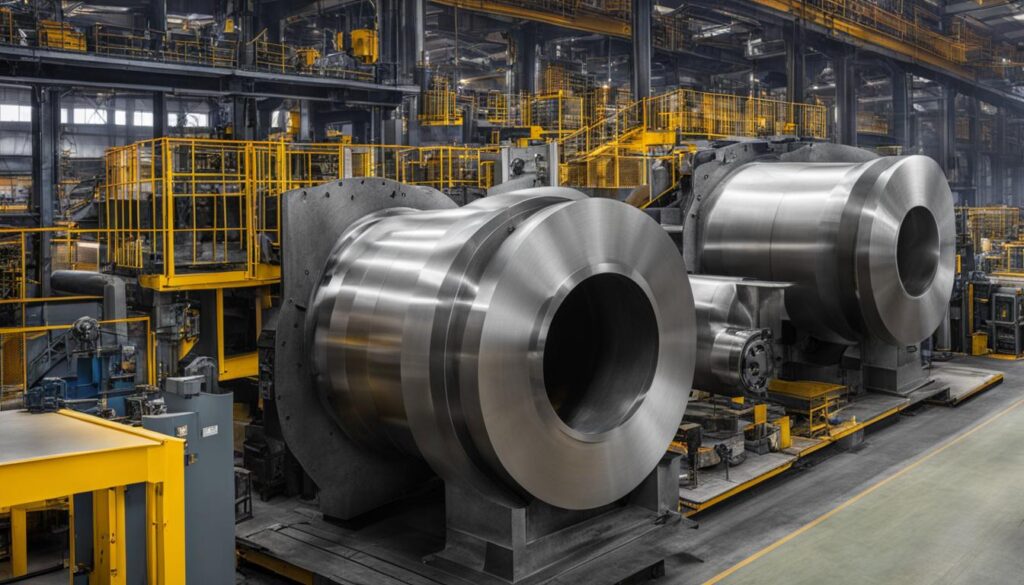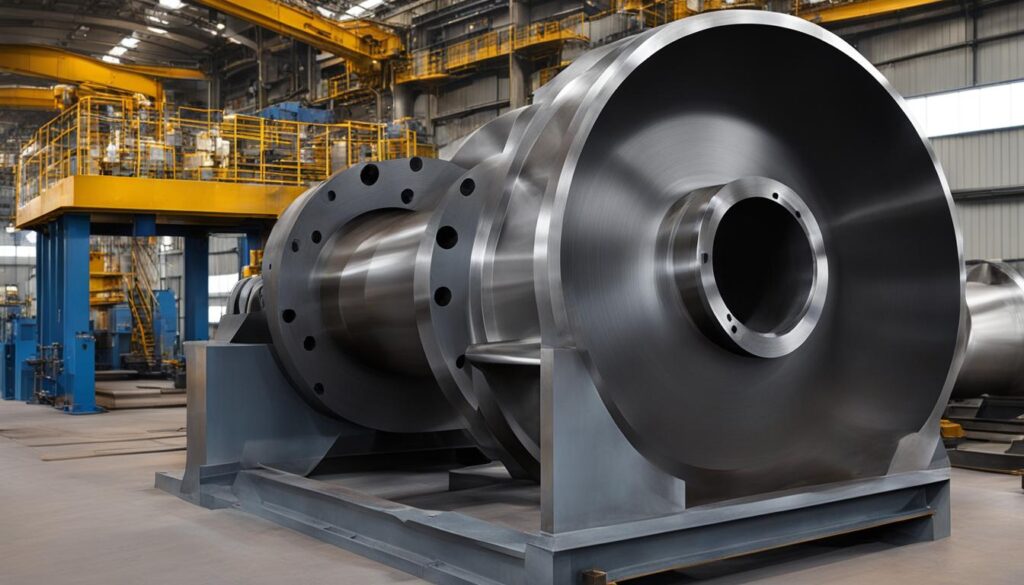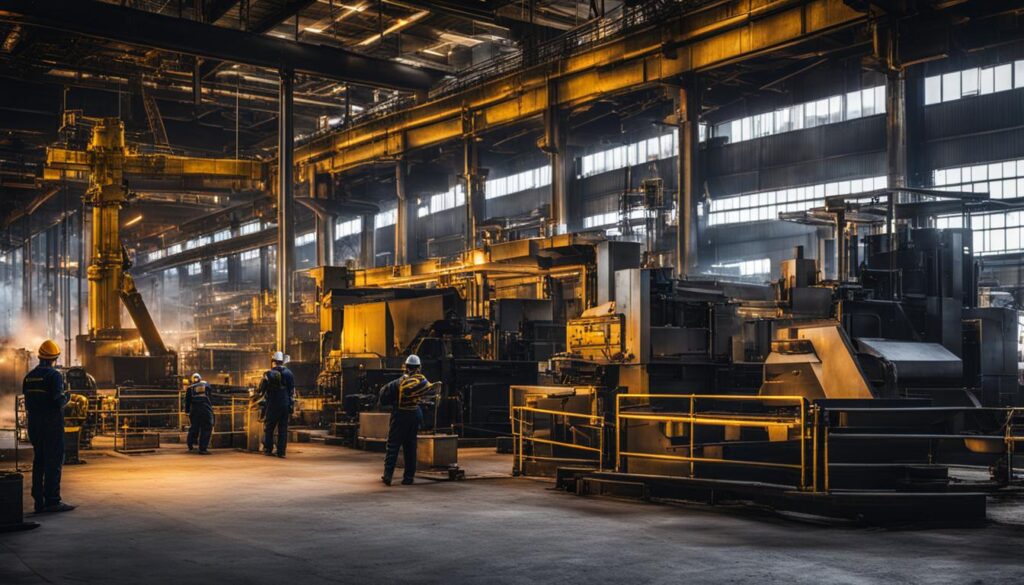In today’s fast-paced industrial landscape, the need for materials that can withstand harsh conditions, maintain high productivity, and cater to various applications has never been more crucial. Alloy steel castings have emerged as a game-changing solution for such requirements, making them essential to the success of multiple key industries, including agriculture, defense, automotive, and renewable energy. At KT-Foundry, we understand the importance of metal castings in numerous industrial applications and strive to provide quality products tailored to the specific needs of each sector.
Key Takeaways
- Alloy steel castings are indispensable in various industrial applications due to their unique properties.
- The ability to withstand harsh conditions and maintain high productivity sets alloy steel castings apart.
- Industries like agriculture, defense, automotive, and renewable energy rely heavily on these materials.
- Alloy steel castings contribute significantly to the growth and efficiency of multiple sectors.
- KT-Foundry is dedicated to providing high-quality alloy steel castings tailored to industry requirements.
The Integral Role of Alloy Steel Castings in Various Industries
Alloy steel castings support critical operations across various industries, from the production of machinery to the provision of infrastructure, and are within arm’s reach in daily life. They contribute to 90% of manufactured durable goods and machinery in the U.S., with the industry reaching $33.1 billion in annual sales. In defense, they’re used in military vehicles and firearms; in automotive, for casting engine blocks and contributing to fuel-efficient, safe vehicles; in construction, for creating robust structures capable of bearing heavy loads.

In healthcare, alloy steel casting’s precision is crucial for medical tools, while in alternative energy, it allows for the manufacturing of components withstanding tremendous stresses, like windmill hubs. Additionally, metal castings are vital in manufacturing processes, supporting jobs and services throughout the supply chain and profoundly affecting our quality of life.
| Industry | Examples of Alloy Steel Castings Usage |
|---|---|
| Defense | Military vehicles, firearms |
| Automotive | Engine blocks, contributing to fuel-efficient and safe vehicles |
| Construction | Robust structures, heavy load-bearing components |
| Healthcare | Medical tools, surgical instruments |
| Alternative Energy | Windmill hubs, turbine components |
These integral cast components have a considerable impact on manufacturing machinery and infrastructure, as their unique properties ensure durability, precision, and reliability, which are essential characteristics for modern industries.
Enhancing Durability and Performance: The Advantages of Alloy Steel Castings
Alloy steel castings are sought after for their exceptional strength and toughness, which are essential for enduring heavy loads and aggressive environments associated with metal machining machinery operations. By incorporating elements like carbon, silicon, manganese, chromium, and nickel, their mechanical properties are significantly enhanced, making them suitable for applications where high strength and toughness are non-negotiable.

Exceptional Strength and Toughness
Alloy steel castings provide the necessary strength and durability required for various industrial applications. The toughness in adverse conditions is a result of the strategic incorporation of specific alloying elements. The following table highlights the contribution of different alloying elements in enhancing the strength and toughness of alloy steel:
| Element | Strength Contribution | Enhanced Toughness |
|---|---|---|
| Carbon | Increases tensile strength and hardness | Reduces brittleness |
| Silicon | Improves strength and hardenability | Increases impact resistance |
| Manganese | Increases hardenability and wear resistance | Improves tensile strength |
| Chromium | Enhances abrasion resistance and hardenability | Increases toughness |
| Nickel | Boosts strength and hardenability | Enhances impact resistance |
Corrosion and Wear Resistance
Another significant advantage of alloy steel castings is their corrosion resistance and wear-resistant properties, an invaluable property in prolonging the lifespan and maintaining the efficiency of industrial machinery and infrastructure components. This capacity for resilience in corrosive or wearing conditions is vital to ensure the continuous and reliable performance of the components made from these materials.
“Alloy steel castings are known for their significant resistance to various environmental factors, making them an ideal choice for a wide range of applications.”
Withstanding Extreme Conditions
Alloy steel castings exhibit extreme temperature resilience and durability in harsh environments. Their ability to withstand extreme temperatures and environmental conditions is a pivotal quality for applications in defense and mining, where equipment may sit unused for extended periods yet still requires immediate operational readiness. Similarly, this durability underpins components in renewable energy infrastructure like windmill hubs, which must resist variable weather and stresses over time.
- Defense applications: weapons systems, vehicular armor, and propulsion components
- Mining equipment: drill bits, cutting tools, and heavy machinery parts
- Renewable energy infrastructure: windmill hubs, solar panels, and related systems
Alloy steel castings play a significant role in modern industries, providing the desired strength, toughness, and resistance to wear and corrosion. By understanding the advantages of these castings and how they enhance durability and performance, it is clear why they remain a critical resource across various sectors.
Alloy Steel Castings: The Backbone of Industrial Machinery
As the backbone of manufacturing, industrial machinery alloy steel castings lend structural integrity and functionality to a vast array of critical machinery components. By meeting high strength, precision, and reliability requirements, alloy steel castings ensure the optimal performance of key elements in numerous industrial applications.
In particular, the indispensable role of alloy steel castings is evident in the production of the following core components:
- Gears
- Shafts
- Valves
- Pump casings
- Turbine blades
These essential parts rely on the outstanding machinability of alloy steel castings in order to be shaped and finished in line with stringent design specifications and quality standards. Consequently, they exhibit the capacity for optimal performance in even the most demanding industrial environments.
Alloy steel castings are not only integral to the manufacturing process; they ensure the safety, efficiency, and long-lasting usability of the final products.
Fulfilling the high expectations placed upon them, alloy steel castings have become the go-to choice for manufacturers seeking resilient materials that can handle the rigors of industrial machinery.
| Component | Significance of Alloy Steel Casting | Industries Impacted |
|---|---|---|
| Gears | High strength and wear resistance | Automotive, construction, agriculture |
| Shafts | Excellent toughness and durability | Power generation, transportation, mining |
| Valves | Corrosion resistance and precise manufacturing | Chemical processing, water treatment, oil and gas |
| Pump casings | Able to withstand extreme pressures | Automotive, marine, aerospace |
| Turbine blades | Temperature and fatigue resistance | Power generation, aerospace, defense |
Manufacturers can take advantage of alloy steel castings’ inherent qualities not only to develop and manufacture high-quality machinery, but also as a building block for further advancing the overall industry’s capabilities. The leading role of alloy steel casting in modern industrial machinery will undoubtedly persist as demands for higher performance, durability, and efficiency continue to grow.
Alloy Steel Castings in the Manufacturing of Precision Components
In modern industries, alloy steel castings play a significant role in the manufacturing of precision components, ensuring that they meet the rigorous demands of their applications. With the ability to facilitate complex shapes and designs, as well as achieve the required mechanical properties, these castings are integral to creating high-quality parts for a wide range of industries.
Facilitating Complex Shapes and Designs
Due to their inherent design flexibility, alloy steel castings enable the creation of components with intricate and complex shapes, providing a level of flexibility unmatched by other materials and methods. This is particularly important in the manufacturing of precision machinery parts, where the need for tight tolerances and complex configurations is critical.
Alloy steel’s excellent machinability greatly contributes to this design flexibility, allowing for easier welding, forging, and precision metal machining. As a result, alloy steel castings can be used to manufacture parts that not only meet strict design specifications but excel in their applications and ensure long-lasting performance.
Achieving the Required Mechanical Properties
Utilizing alloy steel castings is essential for manufacturing components that require specific mechanical properties. These properties, such as strength, durability, and resistance to wear and corrosion, are achieved through the careful tailoring of alloy compositions.
Mechanical properties like tensile strength, hardness, and toughness are crucial to the performance and longevity of precision components in various industries. By leveraging alloy steel castings, manufacturers can create components that perform optimally in their respective applications, ensuring efficiency and reliability across the board.
Alloy steel castings facilitate both complex shapes and designs, as well as achieve the required mechanical properties in the manufacturing of precision components, making them indispensable in modern industries.
In conclusion, alloy steel castings play an integral role in the manufacturing of precision components, providing unparalleled design flexibility and the ability to achieve specific mechanical properties vital to their performance. Whether it’s in creating intricate parts for high-precision machinery or forging durable components for industrial applications, the use of alloy steel castings remains crucial for driving innovation and progress in a wide range of industries.
Conclusion
At KT-Foundry, we recognize the essential role of alloy steel castings in advancing industries and maintaining a high quality of life. These materials are crucial in supporting manufacturing jobs, enhancing product longevity, and leading innovations for a more sustainable future. As a key component of the metal casting industry, where precision and durability are paramount, alloy steel castings will continue to underpin the evolution of modern industrial capabilities and infrastructure development, ensuring progress and efficiency across all sectors.
Moreover, we believe that the future of industrial advancements lies in constantly improving and refining the properties and applications of alloy steel castings. This will enable industries to create more efficient, durable, and sustainable products and processes, ensuring that they remain competitive in an ever-changing global landscape. The adaptability and versatility of alloy steel castings make them essential components in the quest for innovation and excellence in various sectors, including defense, automotive, construction, healthcare, and alternative energy.
At KT-Foundry, our commitment is to push the boundaries of what’s possible with alloy steel castings, constantly investing in research, development, and state-of-the-art technologies to deliver the highest quality products and services to our clients. In doing so, we aim to play a vital role in shaping the future of industry, supporting businesses, and ultimately, helping to improve the quality of life for all.
FAQ
In what industries are alloy steel castings essential?
Alloy steel castings are critical to numerous key sectors, including agriculture, defense, automotive, culinary, mining, construction, healthcare, paper, and alternative energy. These industries benefit from the unique properties that alloy steel offers, such as its ability to withstand harsh conditions, large loads, and maintain high productivity levels.
How do alloy steel castings contribute to infrastructure development?
Alloy steel castings play a foundational role in modern infrastructure projects. In the construction industry, they are used for critical components like manhole covers, sewer pipes, and building frames. These materials ensure that structures can hold up under heavy loads and last for extended periods despite adverse environmental conditions.
What are the advantages of alloy steel castings in terms of strength and durability?
Alloy steel castings are known for their exceptional strength and toughness, which are crucial for applications that involve heavy loads or aggressive environments. By incorporating elements like carbon, silicon, manganese, chromium, and nickel, the mechanical properties of these materials are considerably enhanced, resulting in superior strength and toughness for various applications.
How do alloy steel castings resist wear and corrosion?
Alloy steel castings offer invaluable wear and corrosion resistance properties, ensuring the continuous and reliable performance of the components made from these materials. This capacity for resilience in corrosive or wearing conditions is vital for maintaining the efficiency of industrial machinery and infrastructure components, ultimately prolonging their lifespan.
How do alloy steel castings facilitate the manufacturing of precision components?
Alloy steel castings allow the creation of components with complex shapes and designs, providing unmatched design flexibility compared to other methods. They enable the manufacture of precision machinery parts with intricate configurations, while their excellent machinability enables easier welding, forging, and precision machining processes.
What is the importance of alloy steel castings in the future of industrial advancements?
As key components of the metal casting industry, alloy steel castings underpin the evolution of modern industrial capabilities and infrastructure development, ensuring progress and efficiency across multiple sectors. They play an integral role in supporting manufacturing jobs, enhancing product longevity, and driving innovation for a more sustainable future.


